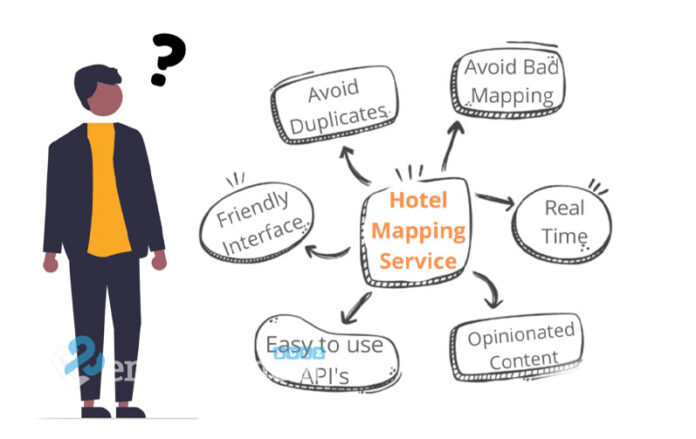Hotel Mapping is a process of curating hotel content data coming from various suppliers by merging property IDs and creating one unified ID to avoid duplicate and inconsistent listings.
Both hotel and room mapping empowers travel businesses to display relevant hotel and room attributes with about 100% accuracy, which prepares the ground for high conversion numbers and positive customer ratings. Also, it nullifies potential losses due to duplicate listings of hotels and rooms.
The necessity of mapping for OTAs, DMCs, TMCs, and Hotel Suppliers
All travel businesses sourcing hotel and room data from multiple sources need mapping to ensure the data they are putting out is correct, unique, and caters to the intent of their potential customers.
However, there is a set of travel businesses; for them, mapping is not a subordinate exercise but a compelling necessity. Here, in this article, we break down the need for mapping for those travel players.
Online travel agencies (OTAs)
As per Phocuswright’s research, about 51% of hotel bookings are made through OTAs. Not just accommodations, but OTAs are also the largest distributors of other travel products like flights, cruises, and transfers. They have a massive flow of third-party data to deal with, which is also true for hotel suppliers.
OTAs source hotel and room content from multiple suppliers, and this data is extremely crude. Often has numerous duplicates of the same hotel and room content, missed addresses, incorrect geolocations, and missing essential amenities. Inaccuracy or absence of any of these attributes leads to massive losses. Therefore, OTAs need automated mapping tools that sensitize their hotel and room content in real-time.
Destination management companies (DMCs)
Destination management companies mostly have directly contracted hotels coming from multiple suppliers, which often have duplicates leading to duplicate bookings or overselling. That is why they need solid mapping to ensure their inventory is unique and their customers do not end up booking the same property twice.
And, if they want to widen their horizons, go global, or partner with other players at specific rates, they need mapping because they might have cracked the rate deal. Still, if they are not accurately mapped, if there’s inconsistency on either side, they might have to suffer huge losses. And the reconciliation becomes even more cumbersome due to the unavailability of data.
Travel management Companies (TMCs)
The OTA (Online Travel Agency) use case we previously mentioned is valid for TMCs as well. Apart from that, TMCs work on pre-paid models with suppliers and raise invoices at the end of every month.
The identification of hotels must be the same for both TMCs and suppliers. At times, TMCs book hotels, and by the time check-in happens, hotels shut down or not be in operation. Now, TMCs have no solid way to prove such a hotel did exist at one point in time. If TMCs have their hotel data mapped, they can persistently keep a record of each booking. That is why mapping becomes a necessity for TMCs both for operations and reconciliations.
Corporate travel management companies manage corporate travel portals for large corporates. They source data from GDSs (Global Distribution Systems), and data availability is terrible for them. Especially the data coming back to them, which most employees submit through invoices. E.g., An Invoice has a hotel name city name, and the city has multiple hotels from the same name, say, Hyatt, Dubai. Now CTMs have no way to know which hotel was booked.
To aggregate the data, run analytics, and raise invoices, CTM strictly needs a mapping solution to know which travel product was booked, where, and when.
Hotel Suppliers
Hotel suppliers have so many aggregation sources. They source hotels from other suppliers and channel managers and have directly contracted hotels. Quite often, they also source hotels directly from hotel chains. Due to multi-channel sourcing, the odds of getting duplicate content go significantly higher. That is when they need mapping to deduplicate and refine content and be able to sell unique hotels at competitive rates.
To conclude, mapping tools help all the travel players mentioned above accurately deliver travel products, facilitate easy settlements, and maximize profits by using the full inventory capacity.

